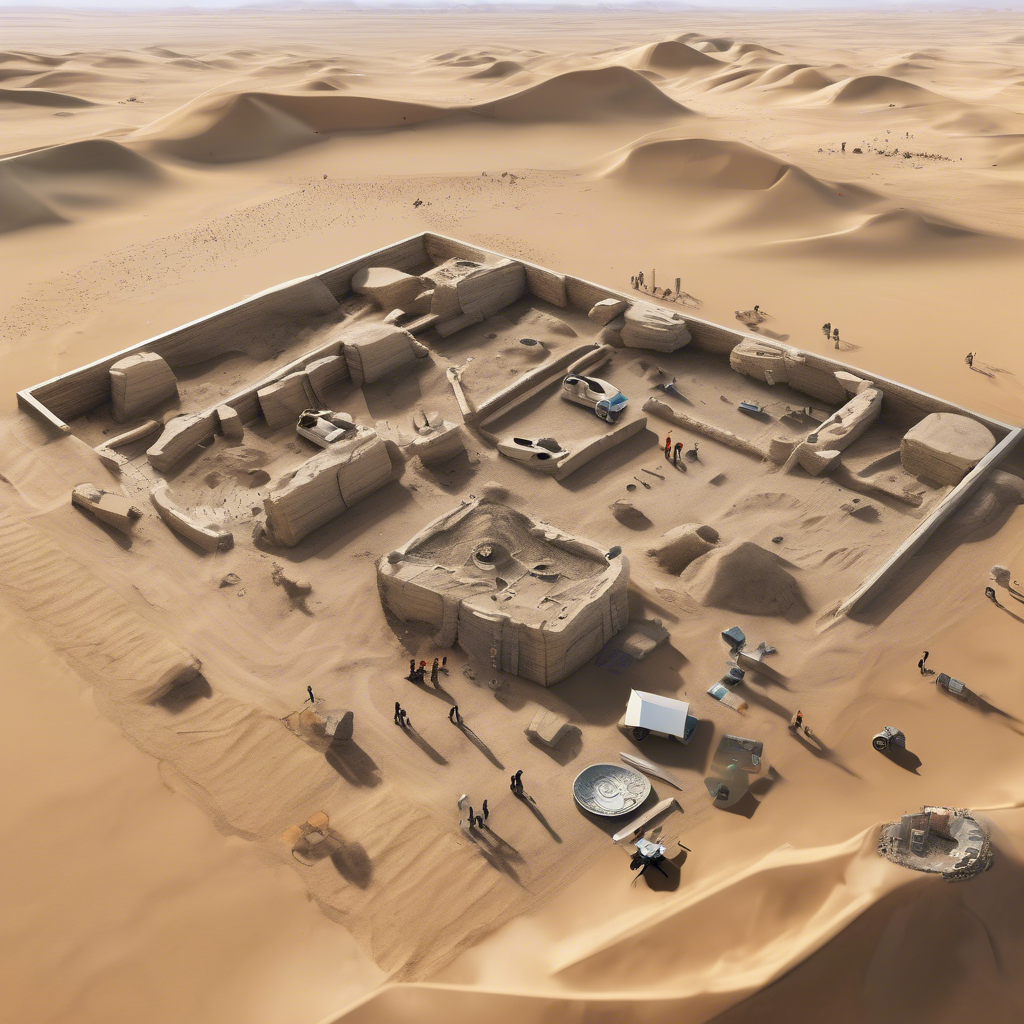Revolutionizing Archaeology: AI and Synthetic Aperture Radar Uncover Ancient Civilizations

Scientists are leveraging artificial intelligence (AI) combined with Synthetic Aperture Radar (SAR) technology to uncover evidence of ancient civilizations dating back thousands of years in regions like Dubai and Mongolia. This innovative method is transforming archaeological research by offering an efficient alternative to traditional excavation. SAR, a radar system that produces detailed images of Earth's surface, penetrates vegetation, sand, and shallow soil layers to detect man-made structures invisible to conventional imaging or the naked eye. When integrated with AI algorithms that analyze vast radar datasets, researchers can identify potential archaeological sites with remarkable precision and speed. A notable use of this technology is in Dubai’s deserts, where traces of 5, 000-year-old civilizations lie hidden beneath the terrain. Previously, locating these sites relied on slow, costly, and uncertain excavation. Utilizing AI-processed SAR data, scientists quickly scan large areas, revealing outlines of ancient settlements, pathways, and other human-made features covered by sand. Similarly, in Mongolia, this AI-radar combination has enabled study of medieval sites obscured by dense vegetation and tough terrain, which impeded traditional fieldwork.
The technology has uncovered remains of settlements, fortifications, and roads that shed new light on social organization and cultural developments of the medieval era. Beyond detection, the AI and SAR approach preserves fragile sites by avoiding invasive digging, thereby protecting their physical integrity and contextual information. Rapid large-scale mapping helps prioritize which sites warrant further detailed investigation, optimizes resource allocation, and supports more comprehensive reconstructions of past human civilizations. Experts anticipate that as AI models and radar imaging advance, this technique will reveal more hidden aspects of human history worldwide, including forgotten settlements, trade routes, and cultural landmarks concealed by time and natural processes. Additionally, combining AI with SAR provides valuable tools for environmental monitoring. Insights into ancient human-environment interactions can guide modern land-use planning and conservation efforts, particularly in regions susceptible to climate change and desertification. The success of these projects stems from interdisciplinary collaborations among computer scientists, archaeologists, geographers, and historians, reflecting the growing importance of merging technological innovation with traditional scholarship to enhance understanding of humanity’s heritage. As the field evolves, public interest in archaeological discoveries facilitated by AI and SAR is expected to increase. Museums, schools, and cultural institutions can use these findings to develop engaging exhibits and educational resources that bring ancient history to life in novel ways. Ultimately, the integration of AI and Synthetic Aperture Radar is ushering in a new era of archaeology—one that reveals centuries-old secrets buried beneath the Earth with clarity and care, enriching our comprehension of human origins and how ancient peoples shaped the modern world.
Brief news summary
Scientists are combining artificial intelligence (AI) with Synthetic Aperture Radar (SAR) technology to uncover ancient civilizations hidden beneath difficult terrains such as Dubai’s deserts and Mongolia’s landscapes. SAR can penetrate vegetation, sand, and soil to detect buried structures, while AI analyzes this complex data to precisely identify archaeological sites without excavation. This non-invasive approach has revealed 5,000-year-old settlements and ancient pathways in Dubai, as well as medieval fortifications and roads in Mongolia, regions once hard to explore. Besides speeding up discoveries, this method protects fragile sites and informs future research. With ongoing advances in AI and radar, more lost settlements, trade routes, and cultural landmarks worldwide are likely to be found. Moreover, these technologies assist in environmental monitoring and land use planning. Growing public interest and education emphasize how the synergy of AI and SAR is transforming archaeology by uncovering hidden histories and enriching our knowledge of human heritage.
AI-powered Lead Generation in Social Media
and Search Engines
Let AI take control and automatically generate leads for you!

I'm your Content Manager, ready to handle your first test assignment
Learn how AI can help your business.
Let’s talk!

AI Language Models' Unpredictable Behavior Raises…
The June 9, 2025 edition of the Axios AM newsletter highlights rising concerns around advanced large language models (LLMs) in artificial intelligence.

Big Week in Congress Advances Cryptocurrency Legi…
This week marked a pivotal moment for the U.S. cryptocurrency industry, with significant legislative progress in Congress amidst intense federal budget debates.

Blockchain's Role in Digital Identity Verification
In recent years, blockchain technology has become a transformative tool for improving digital security, especially in identity verification.

Google Appoints DeepMind CTO as Chief AI Architec…
Google has made a major strategic move in the fast-evolving field of artificial intelligence by appointing Koray Kavukcuoglu, the current Chief Technology Officer (CTO) of its DeepMind AI lab, as its new Chief AI Architect and Senior Vice President.

Meta's Aggressive AI Strategy Amidst Talent Acqui…
Mark Zuckerberg is mounting a strong comeback in the race for superintelligent artificial intelligence, signaling Meta’s renewed dedication to overcoming recent setbacks.

DeFi Leader Aave Debuts on Sony-Backed Soneium Bl…
The agreement will encompass Aave’s involvement in forthcoming liquidity incentive programs, including collaborations with Astar, a blockchain well-known within Japan’s Web3 ecosystem.

Meta's Potential $14.8 Billion Investment in Scal…
Meta is reportedly preparing a major $14.8 billion investment to acquire a 49% stake in Scale AI, a leading artificial intelligence company.

 Auto-Filling SEO Website as a Gift
Auto-Filling SEO Website as a Gift








 Auto-Filling SEO Website as a Gift
Auto-Filling SEO Website as a Gift

